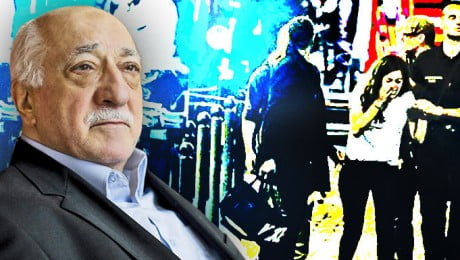Keyword: Fethullah Gulen

US says it does not consider Gülen movement a terror organization
The U.S. has stated that the country does not consider the movement of U.S.-based Islamic scholar Fethullah Gülen a terror organization, a position which stands in contrast with the latest decision taken during a Turkish National Security Council (MGK) meeting on the movement.

Who is Fethullah Gülen, why is the Gülen movement currently being targeted by the Turkish government?
since 2010 the movement and Fethullah Gülen himself have been critical of the authoritarian tendencies in Turkey. It was noticeable during the Gezi Park protests in 2013. The movement began to belong to the increasingly long list of state enemies, according to Erdoğan and the AKP politicians. Different kinds of actions have been directed since then against a so called “parallel state.”

A Comparative Approach to Islam and Democracy
Religion, particularly Islam, has become one of the most difficult subject areas to tackle in recent years. Contemporary culture, whether approached from the perspective of anthropology or theology, psychology or psychoanalysis, evaluates religion with empirical methods. On the one hand, religion is an inwardly experienced and felt phenomenon, one mostly related to life’s permanent aspects.

Everything you’ve ever wanted to know about Fethullah Gulen
The Muslim religious scholar from Turkey preaches a moderate form of Islam — one that regards terrorism as blasphemy and a woman’s headscarf as secondary to education. Gulen is also a wanted man. He is accused in Turkey of leading a terrorist organization that has attempted to topple the government. A Turkish court has issued three arrest warrants for him.

Mr. Fethullah Gülen’s interview for Moskovskiy Komsomolets newspaper
In the interview that was published at one of Russia’s most popular newspapers, Moskovskiy Komsomolets, Mr. Gülen talked about the aircraft crisis between Russia and Turkey, the divided state of the Muslim world, secularism, the Islamic State of Iraq and the Levant (ISIL) and terrorism. “Certain things done [the Turkish government] in recent years were wrong. The downing of that warplane was wrong,” he said.

To embrace the spirit of acceptance and tolerance
The world has judged the two attacks in Paris and Brussels, which claimed a number of lives and damaged property, as associated with Islamic-inspired terrorism. The attacks also delivered the psychological message that acts of terror and hatred can occur even in the most prosperous and highly secured countries that respect diversity and human rights. […]

Gülen condemns Pakistan attack, asks Muslims to protect minorities
Renowned Turkish Islamic scholar Fethullah Gülen has strongly condemned the brutal terrorist attack on a children playground in the eastern city of Lahore, Pakistan that killed at least 72 and wounded more than 300 people, including many children.

Fethullah Gulen Condemns the Terrorist Attack in Lahore, Pakistan and Extends Condolences to Relatives of Victims
I have learned with grief about the horrible terrorist attack in Lahore, Pakistan that took 70 lives, majority of whom women and children, and injured over three hundred people on a children’s playground. I condemn this attack in the strongest terms and on this sad occasion I reiterate my condemnation of all forms of terror regardless of their perpetrators or their stated purposes.

Islamic Scholar Fethullah Gulen Condemns Brussels Terrorist Attacks
Fethullah Gulen, a well-known Islamic scholar, preacher and social advocate, who resides in PA, strongly condemned the brutal terrorist attacks at the Brussels International Airport and Metro station on March 22 that resulted in the deaths of more than 30 people and the injuries of hundreds.

After Fethullah Gülen’s demise what will happen to the Hizmet Movement
To figure out what course of action must be taken for the Hizmet Movement after Fethullah Gülen’s demise, we must look at the movement in its current form. Today, the Hizmet Movement, which is also popularly known as the Gülen Movement, is not administered by a central structure.





















